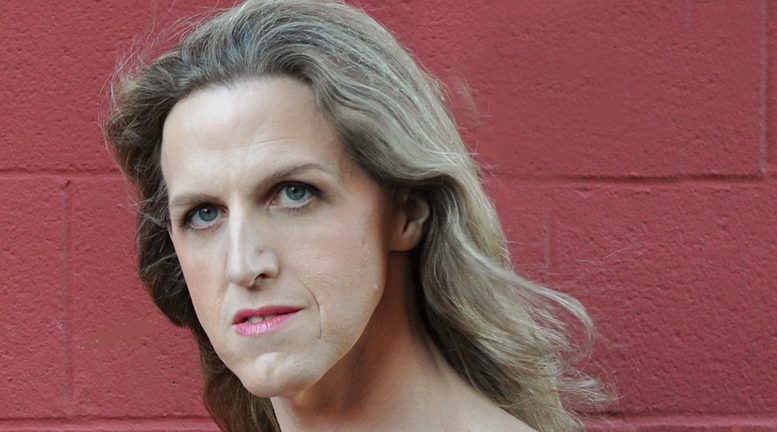By: Lorelei Erisis*/TRT Columnist—
These are serious times, and I’ve written about some pretty serious topics recently. These things are important to write and talk about, but this month I thought I’d talk about something a bit less serious, or at least, less earth-shatteringly awful: makeup.
As a trans woman, and as a woman in this society generally, I’ve had a long and sometimes strange relationship to the stuff. I can get a decent face of makeup on myself, but I’m no expert. I can’t tell you about contouring or shading or blending or any technique beyond the basics. The subject of “makeup” is rarely something I feel qualified to address. However, a Facebook “acquaintance” recently commented on an old selfie of mine: “Are you anti-makeup??”
In the photo, I’m collecting rose hips by the beach on Cape Cod. It’s a nice picture and I think I look really pretty in it. Of course I’m not wearing makeup, because as a good Cape Cod girl, it would be ridiculous for me to put on a full face to go climbing around in thorny, sandy beachside rose bushes.
I immediately understood the question’s subtext as a vaguely misogynistic and possibly transmisogynistic criticism of my choice to show my face publicly without meeting 21st Century Western standards of “femininity.” Even knowing this, I hate to play other people’s games, so rather than react angrily (a normal, human reaction) or ashamedly (the reaction that the commenter likely expected), I took the opportunity to reflect on my own relationship with makeup as a woman, and specifically as a transgender, femme-identified woman.
For the first few years of my transition, I would seldom leave the house dressed “en femme” without makeup. It took a few things to break me of the habit of regular makeup use: living in New Orleans in early summer, where I would sweat makeup off as quickly as I could apply it, and then moving to Northampton, Mass., where my butch lesbian friends and practical Yankee friends alike would judge my makeup-wearing habit (motivated by femme-phobia, perhaps, but a powerful social norm nonetheless).
The norm among my closest friends and family here in New England is little or no makeup, and that’s my usual these days—but I’m not anti-makeup at all. Sometimes, I really like it! When I get it right, it makes me feel pretty and particularly femme-y. There are also situations where it can be useful. When I’m performing on stage, it helps to compensate for the effects of distance in communicating expression and nuance. When I know people will be taking lots of pictures of me, which happens often in my life, I like to present a polished look for the camera—partly for my audience and partly because I’m just as judgy as most other women I know about the little flaws and imperfections I see on my face in pictures.
As a trans woman, I also sometimes choose to wear makeup as a type of armor. When I’m worried about not being accepted, or even actively mistreated, I use makeup to conform to what I perceive is “expected,” despite not being the kind of woman who usually cares about these things.
As a performer, adventurer, and activist, I say yes to random adventures whenever possible, so I often end up as a visible trans woman in places that aren’t necessarily LGBTQ friendly or “safe” spaces. On a recent trip to Los Angeles to host a stand up comedy show, I wore makeup every day—I didn’t leave the house without it. Right now I’m in Austin, Texas, and I find I’m doing the same thing, even though Austin is just about the safest place in Texas for me to be whoever the hell I want, however the hell I want. As a trans woman, makeup can be a way for me to assert my femininity to the people around me.
So what am I saying? Makeup—or lack thereof—doesn’t define a woman or say anything about her other than “I decided to wear makeup (or not) today.” I know strong, beautiful feminists who rarely wear makeup, and equally strong, beautiful feminists who won’t be seen without it—even at the beach.
Many of my selfies are without makeup or “imperfect” in some way, because I want folks to see a trans pageant queen who can enjoy being all glammed out—and also take pride in my normal-looking, flawed, still-totally-gorgeous self without makeup.
I want you to know—especially younger women, both cis and trans, and newly transitioning trans folks of any identity—that there are no wrong choices when it comes to makeup. If you object to makeup on principle, but find yourself wearing it because you feel unsure in a strange place, or you know it’ll help you get through the workday with less strife, that’s okay. If you put on a full face to go to your job at the construction site because it makes you feel pretty, that’s okay too. Makeup is just a tool, and if you’re using it in the way that makes you feel safest and happiest in your own skin, then you’re doing it right.
Slàinte!
*Lorelei Erisis is an actor, activist, adventurer and pageant queen. Send your questions about trans issues, gender and sexuality to her at: askatranswoman@gmail.com.








Wearing makeup in LA and Austin is also part of fitting into those places. They’re both places where it’s much more universal for women to wear it that it is in Boston, let alone Northampton. LA is a very image-conscious place, probably because of the pervasiveness of Hollywood and show business. Austin is in Texas, a state where women seem to routinely adopt much more heavily made up looks that we see here in Boston, at least in the cities.
I am not a transwoman, but I did read the article with great interest. I think my own history with make-up was very similar; I wore make-up for certain jobs or dates but not the rest of the time. Of course, I’m in Western Massachusetts, not everyone wears make-up here. I don’t need it to hide behind anymore, so now it’s just fun (enter Cyndi Lauper).